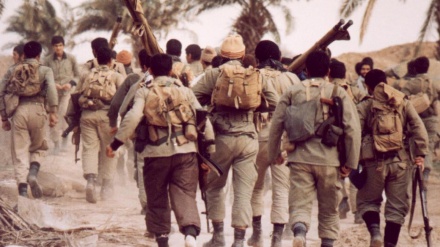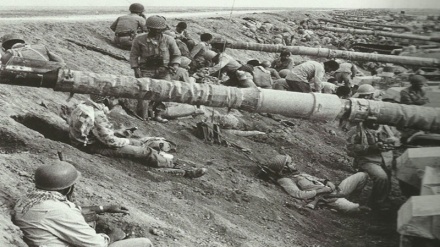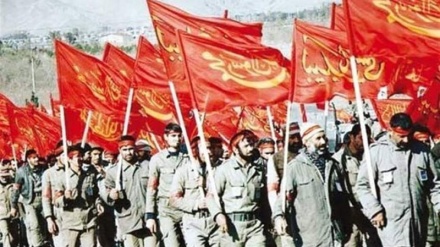Glimpses of Epic of 8-Year Holy Defense (64)
In the previous article we talked about the outcomes of Badr Operation and the impact of the two Kheibar and Badr operations on changing the battle scene and the failure of Saddam's Ba'athist army to confront the huge flood of Iranian combatants on the border region called Hoor (Wetland).
Saddam's supporters and partners-in-crime in both eastern and western blocs realized that they were unable to stop the advance of Iranian combatants by providing political, economic and military support to the dictator in Baghdad. The Iranian combatants, with faith and reliance on God, enjoyed such high spirits and war skills. Nevertheless, despite being equipped with a variety of modern weapons of the west and east, the Ba'athist army lacked such spirit.
Following Iraq's frustration and humiliating defeat in the face of diverse tactics of self-sacrificing Iranian combatants, the Iraqi dictator Saddam decided to once again intensify bombing of Iran's cities. This was done in a vain bid to cause doubt among the Iranian people in defending their country and the Islamic Revolution on the one hand; and to increase pressure on the Iranian officials to end confronting the invading regime of Saddam. But Saddam’s decision boomeranged and the World Quds Day of 1985 turned into a referendum in favour of the great Leader of the Islamic Revolution Imam Khomeini and continuation of holy defense till final victory over Saddam. Nearly five million people took part in Tehran's Friday prayer despite Iraqi air strikes. In other cities, Iranian people had a massive presence at Friday prayers and the rallies of World Quds day after it.
In line with Saddam’s effort to take the war into the Iranian cities and targeting Iran’s ships and oil tankers in the Persian Gulf, the support of the western and eastern blocs for Saddam became more evident. The regimes that claimed peace and human rights completely closed their eyes to Saddam's crimes and bombardment and missile attacks on Iranian cities, and even equipped him with chemical weapons.
Since the outbreak of the imposed war, the French regime was one of the sources of weapons and ammunition for the Iraqi army. This trend continued so that in the summer of 1983, France turned into one of the main suppliers of arms for the invading Ba'athist regime. Thus, the French Mirage jetfighters, antiship Exocet missiles and carrier-borne strike aircraft Super Etandard comprised the backbone of Saddam's army. Therefore, Saddam was enabled to organize an air fleet in the Persian Gulf. The Ba'athist army, using aircraft and jetfighters, was able to launch operations even in the areas near the Strait of Hormuz, 1,500 km from the Iraqi territory. The Ba'athist army was trying to prevent Iran's oil exports from the existing installations in the Persian Gulf especially Khark Island.
During the last 4 years of the war, the Ba'athist army launched attacks on ships and began the war of tankers in the Persian Gulf. Also with the help of the French Mirage planes, Saddam's air force could attack Kangan gas and oil refinery. France also provided Saddam with Rasit radars whereby, the Iraqi army could detect the move of Iran's infantry forces to their positions. The exposes after the end of the war proved that the French top officials had received colossal money from Saddam for that aid. The French arms supply for the Iraqi regime amounted to about $ 11 billion in various types of weapons, including aircraft and missile during the last years of the war. European technical assistance developed the Iraqi missile capability and increased its range to about 800 kilometers. These aids were generously extended while France was aware of the fact that Saddam had invaded Iran's soil and was in pursuit of illegal goals.
Then French Prime Minister Jacques Chirac, on November 30, 1986, stated in an interview that Saddam had initiated the war on Iran. He said that several days before the attack of the Iraqi forces on Iran, he was aware of Iraq's intention, and in a message to Saddam had called for annulling the decision. In response, Saddam claimed that the Iranian army had completely lost its morale and that the Arab minority in Iran would rise up and accept him warmly, and that everything would end within a week. Jacques Chirac went on to say, "But after more than six years of war, this has made the Iranian government stronger." The French prime minister made these remarks after being able to free a number of hostages in Lebanon through Iran.
Despite the awareness of the aggression of Saddam's regime, the French regime did not hesitate to provide Iraq with advanced weapons. France clearly somehow changed Iraq's naval capability. With the arrival of French aircraft, bombs and missiles in Iraq, the power of destruction, accuracy and range of air strikes of the Iraqi air force and navy increased. Attacks on oil tankers intensified since the spring of 1985 after the Badr operation, to obstruct oil export from Khark Island, Iran's largest oil terminal. Hence, Iran created floating terminals outside the war zone, and Iranian ships transported oil from Khark Island to these terminals and foreign tankers shipped Iranian oil. Iran had to buy 22 tankers and increase the capacity of Iranian tankers from 1 million tons to 6 million tons. Until the end of the war, Iran bought or leased a total of 70 tankers.
With the rise of Iraqi attacks in the Persian Gulf, it was natural that Iran could not remain indifferent to bombing of its oil tankers and terminals. Accordingly, the Islamic Republic took protective measures to reduce damage to tankers and resorted to offensive operations to achieve deterrence in the war of tankers. Furthermore, Iranians signed contracts with some firms to accompany the tankers, so that they would immediately be rescued in case of damage.
On the other hand, the Islamic Republic of Iran gradually transferred the location of oil export terminals from Khark Island to Siri Island and then to the vicinity of Larak Island in the Strait of Hormuz. It also advised the ships to change the captain's cabin and direct the tankers from the command line to the front of the ships. Fake targets were placed on some damaged ships to deviate radar signals and attract missiles so that other tankers could safely pass by them. Politically, Iran declared that the Persian Gulf would not be secure for other countries if Iraq disturbed the security of Iran.
FK/RM/ME


